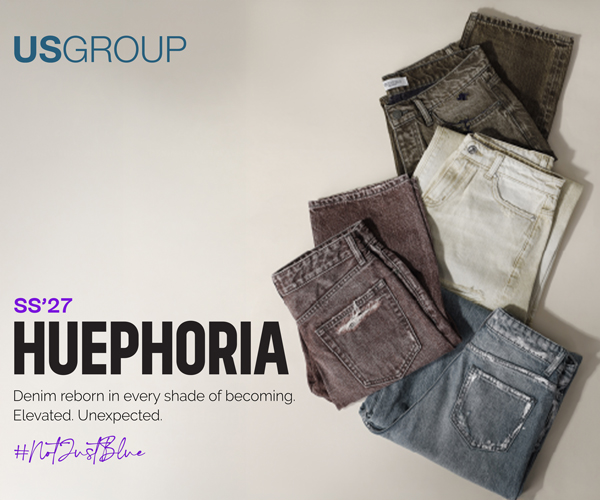Cool threads

Learning the value of print, process and photorealism with Prosperity
Chinese denim supplier Prosperity Textile was founded in the city of Shaoguan, northern Guangdong province, in the year 2002. Beyond deepening its manufacturing footprint with the establishment of a full-scale Vietnamese mill in 2018, the company’s network of sales offices also stretches to France, Turkey, Belgium, Bangladesh, Italy and the US, as well as several cities across China itself, from Zhengzhou to Shanghai, Beijing, Xiamen and Hangzhou, plus more. On last count, it employed over 1,900 individuals globally.
After being introduced at Intertextile Shanghai Apparel Fabrics (Intertextile Apparel) in late August, marketing director Andy Zhong walks Inside Denim through all the latest at Prosperity.
Blue-sky mindset
Mr Zhong joined the denim producer back in 2014. From exhibitions and presentations through hangtag design, content development and press liaison, he oversees all things communication from the manufacturer’s Guangzhou headquarters (home, he says, to thousands and thousands of pairs of jeans, in all shades of blue). This includes brainstorming both commercial and sustainability-forward strategies alongside Prosperity’s teams around the world.
When we met at Intertextile Apparel, the supplier was launching its autumn-winter 2024 fabric collection, which emphasises “new fibres” such as hemp, recycled cotton and Renewcell’s Circulose-branded dissolving cellulose pulp, in addition to the latest Stella Blu-NTX Cooltrans technologies. Product highlights included a double-printed denim trucker with complicated wash effects, “eco-denim aroma” prototype jean jackets, and more. The customisable, deodorising surface details of the latter had been realised via artificial intelligence-enabled digital design platform Metaray, a Prosperity collaborator since earlier last year. Metaray puts together original, trend-led designs quickly and “with a higher hit rate” than human hands and minds, Mr Zhong explains, primarily due to its reliance on big data for decision-making. Indeed, the best part of the job is always that moment when you catch a glimpse of buyer-approved denims made from company-produced fabrics at retail, he shares.
Factory thoughts
July’s announcement of a joint venture between Prosperity-owned Italian design development entity Stella Blu, specialists in indigo yarn dyed fabrics, and Singaporean textile colouration business NTX gives a clear indication of how the Guangdong mill will navigate the coming years at factory level. In gaining access to NTX’s novel Cooltrans technology, which requires no heat and can reduce water usage by up to 90%, Prosperity expects to be able to create eco-friendlier denim with improved colourfastness. Stella Blu’s teams have embraced the challenge wholeheartedly, the China-based marketing director goes on to say, evidenced by yet another standout from Shanghai: Stella Blu Clone+. This “waterless” process attains photorealistic motifs for printing directly onto fabrics, effectively eliminating dyeing and washing. Classic denim effects, more typical of rigid, 15-ounce 100% cotton denims, may thus be printed and transferred onto a four-ounce lyocell fabric to achieve the same visual effects, just with a lower ecological impact.
Bluesign system partner Prosperity already washes with Jeanologia laser and ozone machines, has a caustic soda recovery system in place, and minimises hydrosulfite use where possible. It also recycles wastewater, employs robotic automation in its laundries and has been generating approximately 190,000 kilowatt-hours of energy every year since installing rooftop solar panels in 2016. The producer generally prefers to source certified organic and/or recycled cottons, as well as Better Cotton-approved fibres, Lenzing’s Tencel lyocell and recycled polyester when required. Today, more than 60% of its materials are purchased from eco-friendlier sources, Mr Zhong adds. “The whole idea of sustainable denim is everywhere on the factory floor”, he says.
A new groove
On a related note, Prosperity has been quietly exploring a potential new original brand manufacturer or OBM production model for domestic orders in recent months. Although trials are still underway in this respect, more customers are benefiting from its existing all-in-one or “one-stop” denim clothing development and white-label supply solutions via its Denergy Apparel business. The goal is for Denergy to target small-to-medium overseas fashion brands for jeanswear manufacture, to make space for its more well-established sibling to focus on higher-volume orders in and around the Chinese market. Whereas its “big sister” company can afford to reprogramme and therefore reroute its strategy from the group up, Denergy’s agility – and access to Prosperity’s multifaceted expertise – certainly makes it one to watch.
The denim manufacturer has managed to harness around 190,000 kilowatt-hours of renewable energy every year since 2016, when it first moved to install rooftop solar panels at its main Guangdong site.
All credits: Prosperity Textile













